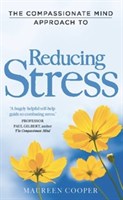Can stress ever be good for wellbeing?
18 Nov 2014 | Maureen Cooper

We all want to live happy and fulfilling lives - it's a natural
part of being human. The question is how do we cope with all the
times when happiness seems out of reach and life is just downright
difficult?
Our society tends to equate happiness with success, so it can be
hard to admit when things are not going as well as we would wish.
This is particularly true when we are dealing with stress. Who
wants to admit that they are feeling overwhelmed and under
pressure, or that sometimes they feel so anxious and worried that
they don't know how to get up in the morning?
To try and keep ourselves on track we tend to push ourselves to
keep going and act as if everything is fine, even when it is not.
However, in order to do that we need to do a lot of pretending -
starting with ourselves - and the easiest way to keep up the
pretence is to distract ourselves from whatever it is that is
causing us all the stress in the first place.
So we go shopping, open a bottle of wine, eat a big meal, or
check out Facebook - we each have our own particular way of
comforting ourselves when we are hurting.
Try recognizing your stress
What if we did the opposite? What if we allowed ourselves to
lean into the places where it hurts, where things are
uncomfortable? Not to lean in so far that we fall into despair but
just far enough that we get a clear idea about what is going
on.
Then maybe we see that the row we had with our partner only
sprung up when it did because we were completely over-tired and
stretched. Or the boss we feel is tormenting us is actually
completely panicked at the thought of being demoted at the next
management overhaul.
In other words, when we try and protect ourselves from stress we
can actually make things worse by avoiding taking a clear,
realistic look at what is happening and getting stuck on what we
think is happening. When we do this we are working from habit,
rather than looking at each situation freshly with awareness and
compassion.
Get to the root of the problem
Let's take a look at four of our habits that get in the way of
awareness and compassion:
1. Distraction
Distraction is a fundamental habit that is so ingrained
that we hardly notice it. We keep our minds so full and busy that
we are rarely simply present and awake to what is going on around
us. Recent research has shown that for 46.9% of our waking hours we
are thinking of something different from what we are doing. This
means we are not fully there for almost half of our lives! This
certainly makes it hard to get a clear picture of what is going on
with us.
2. Wanting things to stay the same
In order to survive and pass on our genes to future
generations our brain evolved to favour certain behaviours. One of
these is the wish to keep everything stable and constant. However,
life shows us that everything is changing all the time - our
bodies, our circumstances, the seasons - and everything that is
created eventually falls apart. Resisting change can cause us a lot
of stress.
3. Trying to keep safe
When we were hunter-gatherers, we needed to know what was
safe to eat and what was not and to ignore what was not immediately
useful. However, in the modern world this has come to mean that we
divide the world up into things that we want, things we think are
bad for us, and things we don't care about. We can get very
stressed trying to keep the things we want and avoiding the things
we don't want.
4. Overlooking how connected we all are
We often miss the extent to which everyone sharing this
planet is connected. For example, how often do we stop and reflect
on the number of people involved in bringing our breakfast on to
our table in the mornings? When we overlook this interdependence it
becomes easier to see our own interests more clearly than those of
other people. So, we tend to think that our own happiness is more
important than the happiness of other people. Sometimes we do not
even notice what is going on with people around us, let alone the
world at large.
Changing perspective
It is not easy to change habits. The brain likes habits because
they save a lot of energy, so it does not seek out new ways of
doing things unless it is forced to. This is where the importance
of developing awareness come in - we need to be able to see how our
old habits are causing us stress and to realize that we need to
develop some news ones to help us work with it.
Meditation training is the most effective way to help us to take
a step back and to see more clearly what is going on with us, and
those around us. When we can do this, then we are more likely to be
inspired to take on the work of trying to change so we can manage
our stress more effectively.
As meditation helps the mind to settle and become more workable,
it enables us to see that we have a choice in how we react to
stress and we start to look for new, more effective tools to help
us. So by looking into our stress rather than trying to avoid it,
we can actually use our experience of stress to inspire us to
replace our unhelpful habits with new, healthy ones.
How increasing compassion helps
One of the most helpful ways of dealing with stress involves
developing a compassionate approach. We all carry compassion within
us, but the word is often misunderstood. For me, developing
compassion is a question of starting with what we have, attempting
to learn from our mistakes and pain and then relating our struggle
to the struggles that every other human being faces.
Stress tends to make us tighten up and narrow our focus, whereas
compassion helps us to ease up and broaden our perspective.
Starting with having compassion for our own suffering and
difficulties, we can gradually extend these feelings of kindness
and concern to people we know, then people we do not know so well
and eventually, even to people we find challenging.
Surprising as it may seem, applying compassion to our experience
of stress can help to improve our wellbeing.


Maureen Cooper has been developing workshops on how to integrate
meditation and compassion training into the workplace for the last
fifteen years. You can find out more about her work on www.awarenessinaction.org or follow her blog here.
Her book, The Compassionate Mind Guide to Reducing Stress
shows how meditation training can help with stress. As well as
referring to many scientific studies in this field, the book has a
varied collection of stories from the workshops that Maureen runs,
detailing how people have put these methods into practice in their
lives. All the techniques and meditations are included, along with
advice on how to integrate them into a busy life. The main purpose
of the book is to provide a practical guide to helping people work
with stress in a creative and sustainable way.